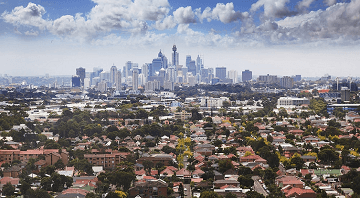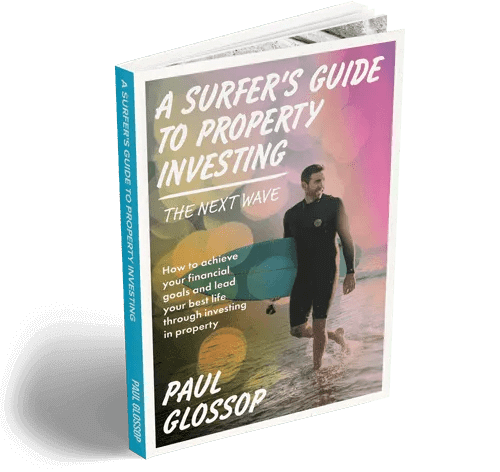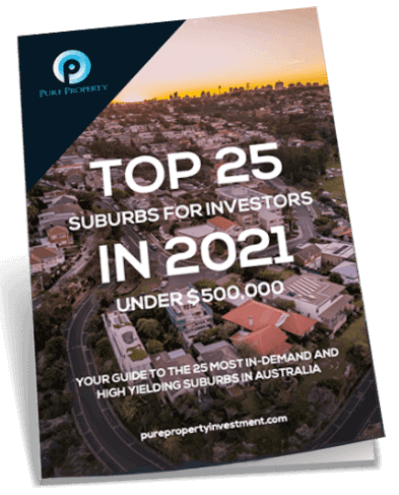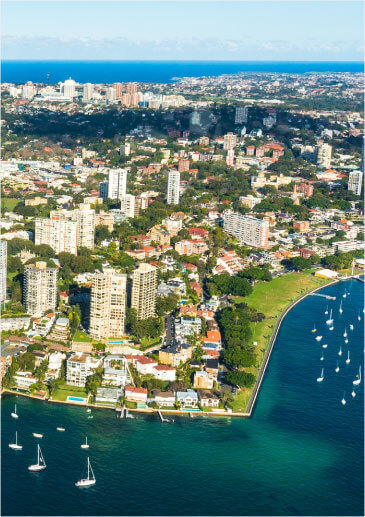South and north of the Sydney market where the opportunities are down from Wollongong, further down the south coast, central coast and Newcastle and beyond. They’re probably about 6 to 12, sometimes 18 months beyond where we are as cycle wise. You know Wollongong grew about five and a half percent. Newcastle grew about seven or eight percent last year or this past 12 months, but they’re on a downward trajectory, so I expect them to probably be with Sydney’s and about six to 12 months and they’ll probably be in that position longer than what Sydney will be because the jobs are still going to be focused around the Sydney CBD.
One Bedroom Apartments in Sydney. Are They Worth It?
One bedroom apartments as an example where a one bedroom apartment sitting as part of this grand scheme will probably that later. Part of that answer is there’s a lot of construction going on. The apartment space, there is still certain pockets in probably more the established areas with minimal amounts of available stock in the newest space that one bedroom apartments will do. Okay, and I’d probably more refer to those walkups red bricks in really the quite strategic areas that are walking distance to all amenities and probably more preferential to baby boomers downsizing and that’s probably the other components are really oversized luxury one bedders in certain areas where again, there’s limited available stock, but the problem with both of those is right now and in the Sydney market is that yields a pretty, pretty terrible. So to hold them cash flow wise is going to be a big stretch for me to justify that over two dozen different markets across Australia right now. I would never ever be able to justify that in this point in time.
Capital Growth And Saving To Buy Back In Sydney
Why I Still Buy In Sydney

The old adage ‘Misery loves company’ seems top of mind for anyone commenting on the Sydney property market at present. Everyone looks to climbing onto the same train – claiming the local market has ‘had its day’ and that the smart money is heading out of town.
And hasn’t it all turned on a dime? It feels like not too far back (just 12 months ago) Sydney real estate could do no wrong and the good times were going to last forever.
I realise dramatic headlines get clicks, but I think observers to cool their heels and take a practical look at why there are still opportunities for skilled property buyers in Sydney right now – in one sector in particular.
Here’s why I’m still buying harbour city property.
History repeats
Philosopher and novelist, George Santayana, once said, “Those who cannot remember the past are condemned to repeat it.”
In real estate circles, things are a little different because those who van remember the past are begging to repeat it so they can take advantage.
Most people might talk about cycles, but I think the market in Sydney is more like waves. There are peaks and troughs and the trick is knowing when to paddle on.
Sydney property has been an outstanding investment option for decades. It’s continued to perform and compound. As a comparison, did you know the ASX is currently around 10 per cent below its peak in 2017? That’s what I’d call a volatile vehicle.
In my view, the present property market softening was due – perhaps even a little overdue – but that doesn’t mean Sydney is dead in the water to investors.
The new NEW normal
Here’s another element inexperienced investors are failing to take on board.
Since 2012, Sydney real estate has performed like no other in the country, achieving around 75 per cent growth in house prices.
For anyone who bought their first ever investment between 2010 and 2013, they have never known the market to move in any direction but up. It’s a fortunate thing to have jagged your timing so perfectly, but it doesn’t nothing for getting some experience under your belt.
Analysis of ABS House Price Index data by Property Investment Professionals of Australia showed across a 15-year period from 2002 to 2017, Sydney was actually one of our least successful real estate markets.
While recent first-time investors have been getting comfortable with the ongoing and inevitable rise of Sydney property values year-on-year, they’ve failed to recognise this seemingly ‘normal market’ was actually abnormal.
But there’s upside… right?
Now I’m not being a pessimist. In fact, long-term annual price growth of between five and eight per cent is more likely than the double digits we’ve been seeing.
In fact, many other statistics look good for Sydney. Employment numbers are strong and there’s plenty of new infrastructure underway too. We are one of the world’s great cities – up there with London, New York, Paris and Tokyo so our cache among travellers and transient international professionals is pretty high.
Sydney will remain the most populous capital in the nation and while plenty emigrate beyond the NSW borders to seek other opportunities, demand for Sydney housing will remain.
What am I buying?
As you can see, I think while Sydney’s property market is softer, there are still opportunities.
For me though, I believe one sector stands out among all others as the best chance to profit. You will not do well purchasing any random listing for your portfolio in the hope of building equity and generating cash flow. You must be surgical in your approach to property selection right now and, in my opinion, the smart money is looking for development prospects.
I believe the best way to ensure you buy right is to seek sites with immediate potential for a subdivision or build project that can yield an increase in equity or a net profit.
These sorts of ventures aren’t for everyone though – they suit more sophisticated investors who have the financial means and experience to tackle them head on.
Best of all, many vendors looking to offload development sites are well aware of the current market conditions. That means they are becoming more negotiable on price, particularly if they need to sell.
The toughest part is finding a property that suit your needs – and this is where the assistance of an experienced buyers’ agent come in. With comprehensive analysis, enviable networks and well-honed negotiation skills, a buyers’ agent is more likely to locate and secure q site for their client in the current market.
If you are still keen to buy Sydney property, don’t fret. Just call on a specialist to ensure ensure you’re buying while others are panicking.
Why I Don’t Have A Household Budget

We’re often lectured on the wisdom of counting every single cent spent on our household budget, but I believe there is a way to become a successful investor without having to pull out your pocket calculator every time you purchase a coffee.
The common wisdom
I’m on the board of the Property Investment Professionals of Australia (PIPA) and was recently at dinner with other board members in Sydney.
Around the table were some of this country’s smartest real estate people. They were casually shooting the breeze and sharing ideas.
Everyone was in good spirits and with a great feed and a few drinks under the belt, conversation inevitably turned to a common interest – property investment and our strategies for wealth building.
Not everyone had the same approach to finance and home administration. Why would they? We were from various backgrounds and at different stages of life. Professionally, some are operating huge teams of buyers’ agents helping clients invest in a broad spectrum of property types across all boarders, while others were more niche in their approach and keeping low-overheads with a small but welded on group of purchasers. Some had been working for decades and had built up their own financial base, while others were still getting established in both their business and personal lives.
While much of our shared wisdom’ was the same, there was one element of finance where I found myself in the minority. The discussion turned to how we manage our own home budgets and most said they maintained a reasonably strict household spreadsheet.
Here’s where I came clean and surprised a few of my compatriots.
…I don’t budget.
Big picture planning first
You’ve probably heard your older, wiser relatives utter the phrase ‘Watch the pennies, and the pounds will take care of themselves.’
Setting aside that we flipped into decimal currency over 50 years ago (which shows you how old this saying is) I agree that monitoring the nuances works for some. If you’re the sort who needs the discipline of corralling the smaller stuff so as to achieve the bigger goal then that’s fine.
That said, my approach is actually an inverse – I use the bigger picture to keep the nuances in line.
My whole philosophy on investing for the life you want revolves around what I call ‘checking your barometer’.
I believe before you begin investing, the very first item on your ‘must do’ sheet has to be writing down the things you consider the most important in life – and I mean the essentials beyond money and material gains.
For example, my barometer setting is dominated by time with my family – and that actually doesn’t require us to spend $20,000 a pop holidaying in the Maldives every six months.
By checking your barometer and defining your ‘happiness essentials’, you can build your investment and lifetime strategy for the future.
Next up, most investors do need to be right across their home finances, but rather than concentrating on the budget alone, I recommend tackling your dollars under the guidance of an experienced financial adviser and/or mortgage broker who specialises in the real estate space. They can lead you through what’s needed for your investment plan – particular in terms of borrowing to build the portfolio.
At this stage, I actually do recommend spending a period (perhaps three months) monitoring your household’s incomes and expenses, to get a feel for how your cash flow moves. This gives you an education on what spending you can flex to help achieve your barometer’s goals.
Finally – build your investment strategy around that end game and follow the path (with constant revision and room to pivot when needed of course).
Dump the budget
Here’s the cool thing I’ve discovered by ensuring my life goals and strategy are set early and dominate my decision making.
If you establish the flow path of barometer goals, financial strategy with professional advice and working knowledge of household’s income, then your approach to how and why you spend money becomes ingrained.
I no longer need to track my budget with surgical precision. How and where I spend money to fulfil my family’s wishes is now second nature. I’ve become holistically better at money management through achieving a necessary income, keeping an eye on my goals, rechecking my personal barometer and making informed choices about where my dollars are used.
I’m uncomfortable with counting the cents because I don’t want to deny those small joys of life as they come around. Why live with the guilt?
Instead, stay strict about your goals and values. You’ll naturally divert money away from unnecessary spends in order to enjoy things you love most. If you and the kids would like to have a great day at Luna Park followed by star gazing at the Sydney Observatory, then do it without compromise. These memories last a lifetime. And if you keep your barometer goals in mind, you will find the funds without blowing the budget.
My mental spreadsheet may not be precise but I have never been caught short and I have built an emotional bank of experiences that didn’t involve me counting how many cappuccinos I was having throughout the day.
Living under the stressful financial shadows of a life dominated by a household budget is not for me – and it doesn’t need to be for you either.
Happy hunting.






